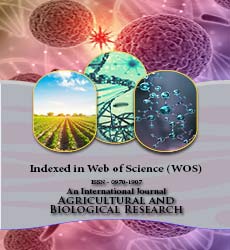Agricultural and Biological Research
RNI # 24/103/2012-R1
Ravi Kishan Soni* and Gajanand Modi
Silicon (Si), though not traditionally considered essential for plant growth, exhibits profound benefits in enhancing crop yields and resilience to abiotic stresses. Its application, particularly in combination with other fertilizers, has demonstrated significant improvements in various crops, including sugar beet, potato, rice, sugarcane and canola. Silicon strengthens cell walls, bolstering resistance to pests and diseases while mitigating the impacts of environmental stressors such as drought, salinity and mineral deficiencies. This multifaceted role extends to radiation-induced injuries, where silicon supplementation has shown promise in mitigating damage and facilitating faster growth recovery in plants. Additionally, silicon deposition in plant tissues, particularly in leaves and hulls, contributes to reduced transpiration rates and enhanced membrane integrity, crucial for combating drought and climatic extremes. Furthermore, silicon alleviates chemical stressors like phosphorus deficiency and toxicity, as well as heavy metal toxicity, through various mechanisms including modulation of metal uptake and distribution. Its role in enhancing salt stress tolerance by decreasing transpiration and improving antioxidant activities underscores its potential in salt-stressed plants. Notably, silicon's beneficial effects vary across plant species, with genetic modifications aimed at enhancing root Si uptake abilities offering promise for widespread application. Overall, silicon emerges as a valuable growth regulator, enhancing plant growth and resilience to stressors, thereby offering significant potential for sustainable agricultural practices. Future research should focus on evaluating silicon's efficacy across a broader spectrum of crops and stress conditions to unlock its full potential in agricultural systems.
